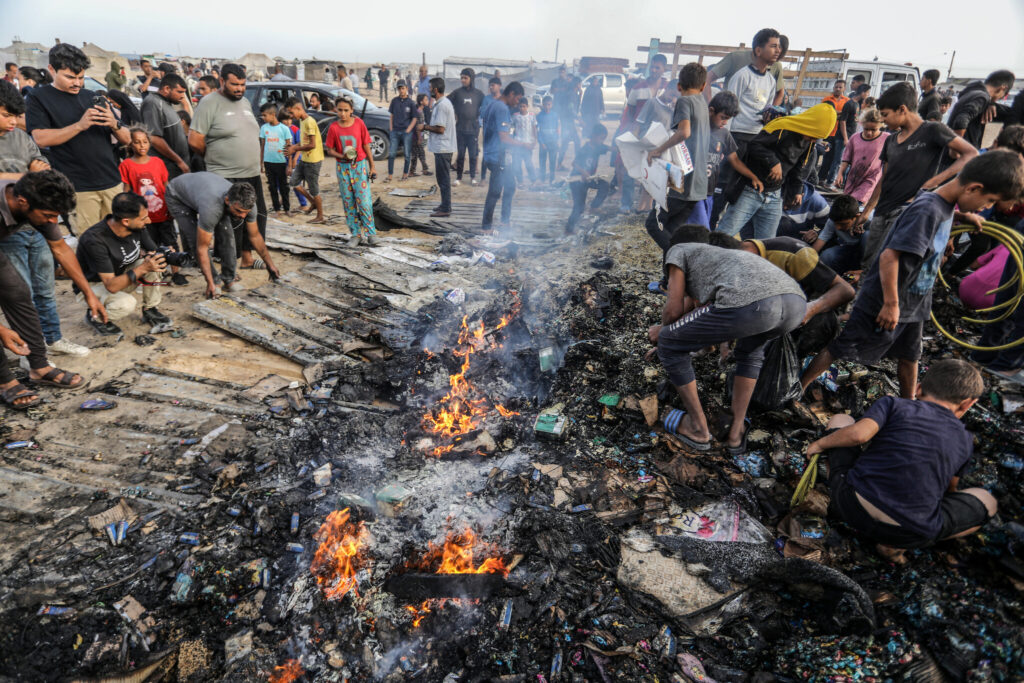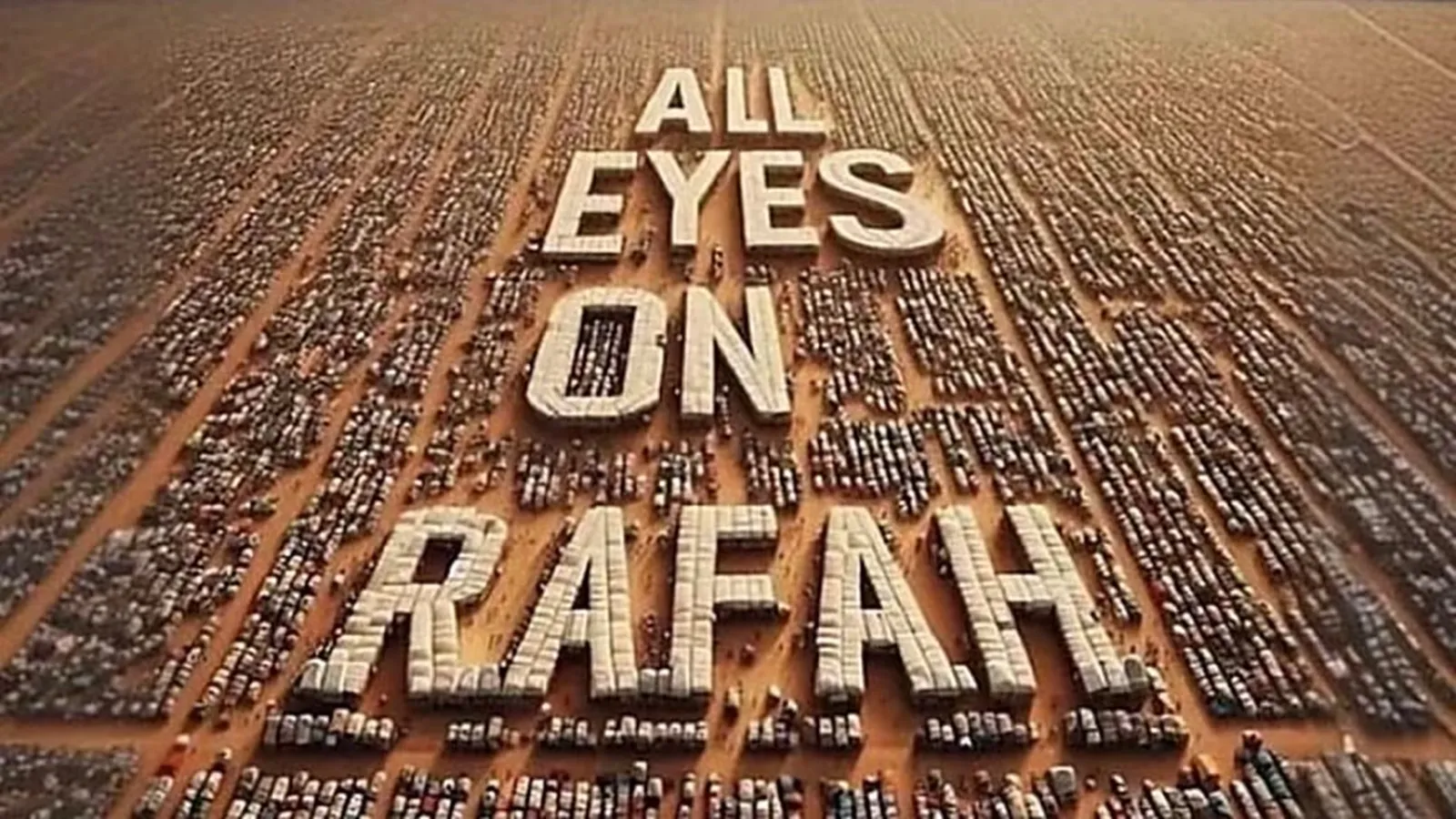On Monday, the 27th of May, during a military operation by the Israeli army in the southern Gazan city of Rafah, 45 people were killed according to the Gaza Health Ministry due to a fire resulting from an airstrike. Amongst the deceased 12 are women, eight children, three older adults and three bodies burned beyond recognition. According to the Ministry and Palestinian Red Cresent Rescue Service, 249 civilians are also wounded to various degrees apart from the death casualties.
The fire broke out in the displacement camp in the Tel-Al Sultan district in the Rafah region near the Palestine-Egypt border, which was a UN humanitarian zone and sheltered war refugees. According to the IDF spokesperson Hagari, the IDF was targeting a structure in which two senior Hamas leaders were meeting which was 1.7 km away from the declared humanitarian zone. He also stated that the explosives used in the Rafah attack – 17-kg munition, which he described as the “smallest our jets can use” – could not have sparked a fire of that scale. “Weapons stored in a compound next to our target, which we didn’t know of, may have ignited the fire,” he said. The veracity of these claims is, however not concrete, as an investigation is still underway.

The fallout acceptance – Rafah attack
Israeli PM Benjamin Netanyahu for the first time since the starting of war on Hamas showed remorse over any IDF operation, and called this “a tragic mistake”.
#AllEyesonRafah, took social media by the storms after reports of the strike and the subsequent fire surfaced online. An AI-generated image of refugee camps, tents and truck beds in the middle of a desert was shared with the tag “All Eyes on Rafah” by netizens on social media platforms worldwide, especially in Western countries and Southeast Asia. On Instagram alone, it has garnered 45 million shares. The IDF faced massive criticism and condemnation on platforms like ‘X’.
On the government level, several countries and leaders also criticised this incident. The European Union was very vocal in their condemnation of Israel and PM Netanyahu. The block’s foreign policy chief Joseph Borrel threatened to implement sanctions on Israel, if it does not stop the war in Gaza. Also, he indicated reviving the block’s European Union Border Assistance Mission (EUBAM) Rafah, which has not been operational since 2007, when the Islamist militant group Hamas seized full control of Gaza. The Foreign Office of Germany, which has been a staunch supporter of Israel for decades, said: “The images of charred bodies, including children, from the air strike in Rafah are unbearable”. “The exact circumstances must be clarified, and the investigation announced by the Israeli army must now come quickly,” the ministry further added.
Inside the country, there also is brewing turmoil, for the Netanyahu government. Israel’s primary opposition party and its leader Benny Gantz joined the emergency wartime government after the Oct 6 attack. On Sunday 27th, he threatened to dissolve the emergency government, citing the reasons, that the Netanyahu government could not prevent the Rafah attack and could not conduct the war in Gaza till now. He has given the deadline of 10th June for the government to answer the major questions regarding the future war and demanded an independent investigation of Netanyahu’s war conduct.
Controlling Gaza
Leading up to weeks before the Rafah attack Israel has been slowly moving into the Rafah region of Gaza, which is situated near the Palestine-Egypt border. Primarily this region has been established as a camp for war displaced, but, according to Israeli sources, it is Hamas’ last major stronghold. Footages of UN aid being used as a Hamas military launch pads, aid trucks used as transport for Hamas soldiers, UN aid workers such as school teachers, medical and first aid personnel working as Hamas soldiers also confirm this claim to a certain extent. The ICJ on the 25th ordered Israel to halt all its operations in Rafah, but Israel continued to move into the region.
USA earlier on May warned Israel that it would stop its weapon shipment to Tel-Aviv if targeted the civilian population in Gaza. After the Rafah attack, America stated that the attack was “devastating” but the scale of the attack was not enough to change U.S. policy. White House spokesperson told in his briefing that Israeli tanks were there to put pressure on Hamas and the Sunday incident “did not violate President Biden’s red line” to withhold weapon shipments to Israel.
In India, the spokesperson for the Ministry of External Affairs, Randhir Jaiswal said that the heartbreaking loss of civilian lives in the displacement camp in Rafah is a matter of deep concern for them. India has consistently called for the protection of the civilian population and respect for international humanitarian law in the ongoing conflict.
The social media campaign All Eyes on Rafah has also faced some major pushback. Accounts of October 7th survivors and tales of Hamas hostages, especially women and children were highlighted countering pro-Hamas posts.
Another major cause for multiple Palestinian casualties is their ignorance of Israel’s warning in moving into warzone. Despite several warnings people are returning to northern Gaza, which is a hotspot of conflict and anti-Semitism is a major contributor. The celebration of October attack and atrocities of Israelis, calling for Jewish genocide, the deep ideological and real-time involvement of Palestinians in the Hamas’ cause are the reflection of that religious hatred.
Continuum of operation
Currently Israel took control of Rafah and maintaining it’s stronghold. Hamas authorities on Tuesday again claimed that Israeli strikes killed another 21 civilians in Al-Mawasi, but the IDF denied any such claims. Israel’s war correspondent said that the conflict could stretch for another seven or eight months and the IDF has no intention of slowing down anytime soon. With recent developments it is yet to be seen how the country will hold its commitments when it comes to Gaza and calculated reactions from opposing and supporting countries.

